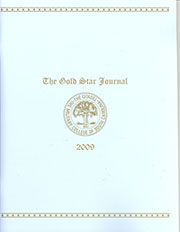Editor-in-Chief
- Leon E. Hontz, Class of 2009, Political Science (International Politics and Military Affairs) and Spanish Major.

The Editors
- Charles (Trey) J. Williams III, 2010, Biology Major and Chemistry Minor.
- Taylor D. Gilliam, 2011, Business Administration Major.
- Thomas J. Sullivan III, 2010, Biology Major.
“We, the editors of The 2009 Gold Star Journal, are honored to dedicate this edition to the hard working men and women of the former Print Shop, which has sadly been lost in our current economic hardships. Previous years they were the unsung heroes and capable backbone of each journal. Annually, we started our process by meeting with them to discuss the physical appearance of the journal. Throughout the design stages they would advise us on our layout. Finally they would publish a professional looking journal for us and our readers. So, in essence, they were the alpha and the omega of The Gold Star Journal, and our gratitude is immeasurable.“
“We dedicate this year’s journal to them, and we say thank you for all the excellent advice, time, energy, interest, and care that you gave us during the course of our relationship. Every member that worked at the Print Shop was incredibly kind and helpful, and we felt respected and welcomed even though we knew we were taking time away from their other work. Those of you who helped us, thank you again, from the bottom of our hearts. In a sense, each journal has been a dedication to your hard work and kindness; we are just taking the time this year to formalize it.”-The 2009 Gold Star Journal
To view the entire 2009 edition, click this link or the cover above.
Featured Papers
“The Importance of The Written Word,” Marttin E. Periola, Class of 2011, English Major.
In today’s world of high-speed technology, an old art is dying out—good writing. Because people practice incorrect grammar due to their preferred ways of communication such as Internet slang, emotions, and texting language, superior writing skills are diminishing. When people do not practice good writing skills daily in their own lives, their success in writing papers and oral communication are greatly hindered. In this essay, the benefits of writing effectively are explored.
“Poppy Paradise,” Tyler L. Gardner, Class of 2009, Biology Major.
The ability to understand a variety of subject matter was illustrated in this assignment for Dr. Joel Gramling’s History of Biology class. Poppy Paradise describes the unique relationship of humanity and analgesic substances through a historical approach to discovery. The impacts of opiates and their derivatives permeate economical, religious, cultural, and national boundaries. Although possibly problematic, the powerful medicinal effects of opiates and their derivatives remain unique in their anti-anxiety, antidepressant, and pain relieving qualities.
“Gender-Based Violence in Darfur: An Epidemic,” Matthew C. Millard, Class of 2009, Double Major in Political Science and English Major.
Darfur is known as one of the most troubled regions of the world, but little is known about the specific problems or hurdles that these neglected people face on a day-to-day basis. This paper addresses the specific problems associated with gender-based violence as a weapon of war in this most troubled region. It is used as a method of control and dominance in order to make one group dominant over another. Completed over the summer of 2008, the research was conducted by the author while at an internship at the Pearson Peacekeeping Centre in Ottawa, Ontario.
“Alexandria as a Cultural Center,” Frankie S. Dioguardi, Class of 2012, Civil and Environmental Engineering Major.
Alexandria may appear on the outside as another typical city, yet thousands of years ago, this was both a place of essential intellectual growth and mystery. Certainly the mixing of the Islamic, Jewish, and Egyptian cultures contributed significantly to the spectacular nature of this city, but often it is wondered how the library of such a great city disappeared suddenly. This paper discusses the culture of the city in depth and the theories of the demise of the library.
“The Current Status of Politics and Oil in Iraq,” Ashley R. Petersen, Class of 2009, Political Science Major.
A major source of political disconnect in Iraq revolves around the production of oil and distribution of the revenues generated. Iraq’s oil resources are in high demand internationally as well as domestically. The Iraqi government must find a way to effectively deal with the repercussions of creating an oil economy, which will have dire consequences for the future of the country. A solution that will take into account sectarian divides, international interests, and the future of Iraq as a whole must be reached. The potential exists to find an oil solution that could have a unifying effect on the nation as well as setting the groundwork for greater education, technology, and industrial opportunities in the region. The future and stability of Iraq rests with finding a successful means of handling their main yet, nonrenewable resource, oil.
“Dystopian Societies in Modern Literature,” Nathan A. Otto, Class of 2010, Political Science Major.
In my paper Dystopian Societies in Modern Literature, I discuss the many ways in which the nightmare futures of Dystopian fiction serve as warnings to the possible courses that our world may take should we fail to protect our individual freedoms. Aspects such as the elimination of the family or totalitarian control by a government are common themes in these novels. We may use these novels to learn and to respect the influence we have on our futures, and the vital importance of guaranteeing our personal liberties so that these fictional societies are never realized. The paper analyzes the role the family and government form in these novels and attempts to draw a connection between them, in order to understand the common cause that brought about these fictional futuristic nightmares.
“A Brief History of Infectious Disease Control,” Charles J. Williams III, Class of 2010, Biology Major.
A History of Infectious Disease Control is a brief look at how historical outbreaks of infectious diseases were handled, and how the actions taken affected the future of infectious diseases. Three basic requirements are necessary for the control of infectious disease: discovery, containment, and destruction. In past outbreaks, these three almost never went hand in hand, and although it proved fatal it taught mankind a great deal about how to deal with it better in the future. Three of the major outbreaks in history were the Great Death in London in 1665, the Plague Riot in Moscow in 1771, and the Influenza Pandemic of 1918. From these historically significant outbreaks the world learned a great many lessons, and many of the protocols in existence today to control outbreaks are a direct result of these tragic events in history.
Featured Photographs
Leon Hontz and Thomas Sullivan







